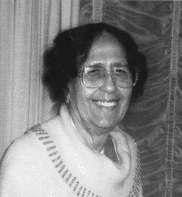Idella Jones Childs
Idella Jones Childs (June 21, 1903 - August 8, 1998) was an American educator, historian and civil rights activist. Childs worked as a teacher for 35 years in Perry County in Alabama. During the civil rights movement, her home was a meeting place for activists. She was the mother of Jean Childs Young, who later married Andrew Young who went on to become mayor of Atlanta. Childs worked as historian, helping to put two places in Alabama on the National Register of Historic Places. She also became the first black woman to sit on the city council in Marion. Childs was inducted into the Alabama Women's Hall of Fame in 2002. An award named after Childs is given out from the Alabama Historical Commission for the recognition of those who have contributed to the preservation of historic African American places.
Idella Jones Childs | |
|---|---|
 | |
| Born | Idella Jones June 21, 1903 Perry County, Alabama |
| Died | August 8, 1998 (aged 95) |
| Nationality | American |
| Alma mater | Alabama State University |
| Occupation | Educator, Social Activist |
| Spouse(s) | Norman Childs |
Biography
Childs was born in Perry County in Alabama on June 21, 1903, and would live her entire life there.[1][2] Childs attended Lincoln Normal School and earned her teacher's certificate there.[2] She studied elementary education at Alabama State University.[2] She married Norman Childs and together they had five children.[3] She earned her degree long after her first child was born.[3] Childs' daughter, Jean Childs Young, was born on July 1, 1933.[4] Childs taught in segregated schools for over 35 years, teaching biology, algebra, history and social studies.[5]
During the Civil Rights Movement, Childs' home became a meeting place for those involved in civil rights in Marion.[6] In 1979, she was named an honorary member of the National Commission on the International Year of the Child by Jimmy Carter.[1][7] She founded and became the first chair of the Perry County Arts and Humanities Council in 1982.[1] In May of 1985, she was appointed to fill a council seat in Marion.[8] Childs was the first black woman to serve on the council.[1] She was re-elected to the seat in 1988.[8] Also in 1988, she was appointed to the board of the Alabama Historical Commission.[9] She helped add the First Congregational Church Building and the Mary Elizabeth Phillips Thompson Auditorium of the Lincoln Normal School to the National Register of Historic Places.[1] Childs earned NASA's Unsung Heroes Award in 1993.[1]
Childs died on August 8, 1998.[10] Hundreds attended a memorial service held in her honor at Lincoln Normal School.[11][12] Childs was buried in the Marion Cemetery on Lafayette Street.[13]
In 2002, she was inducted into the Alabama Women's Hall of Fame.[14] Her son-in-law, Andrew Young, was a keynote speaker.[14] The Alabama Historical Commission's Black Heritage Council gives out an award in her name.[15] The award, known as the Idella Childs Distinguished Service Award, "recognizes people who have contributed to the preservation of African American historic places."[16]
See also
References
Citations
- "Idella Jones Childs (1903 - 1998)". Alabama Women's Hall of Fame. Archived from the original on 6 April 2007. Retrieved 2019-03-11.
- "Childs, Idella Jones, the daughter of". The Montgomery Advertiser. 11 August 1998. Retrieved 10 March 2019 – via Newspapers.com.
- Young 1996, p. 66.
- Bennett, Tom (17 September 1884). "'Graced City' As Advocate for Children, Human Rights". The Atlanta Constitution. Retrieved 10 March 2019 – via Newspapers.com.
- Drake, Eleanor C. (2010). Perry County. Charleston, South Carolina: Arcadia Publishing. p. 126. ISBN 9780738586625.
- Young 1996, p. 352.
- Report to the President: United States National Commission on the International Year of the Child. U.S. Government. March 1980. p. 223.
- Nossiter, Adam (13 October 1988). "Ex-Teacher, 85, Turns Life's Lesson to Her Advantage". The Atlanta Constitution. Retrieved 10 March 2019 – via Newspapers.com.
- "Governor Makes Board, Commission Appointments". The Montgomery Advertiser. 12 July 1988. Retrieved 10 March 2019 – via Newspapers.com.
- Benn, Alvin (13 August 1998). "Young, King Honor Childs at Services". The Montgomery Advertiser. Retrieved 10 March 2019 – via Newspapers.com.
- Benn, Al (16 August 1998). "Childs Left Indelible Mark". The Montgomery Advertiser. p. 3B. Retrieved 10 March 2019 – via Newspapers.com."Childs". The Montgomery Advertiser. 16 August 1998. p. 4B. Retrieved 10 March 2019 – via Newspapers.com.
- "Services Set for Idella Childs". The Montgomery Advertiser. 12 August 1998. Retrieved 10 March 2019 – via Newspapers.com.
- "Landmarks * Places to Visit * Things to Do" (PDF). Perry County, Alabama. Archived from the original (PDF) on 11 March 2019. Retrieved 10 March 2019.
- Benn, Alvin (8 March 2002). "Inductee's Activism Praised". The Montgomery Advertiser. p. 3B. Retrieved 10 March 2019 – via Newspapers.com."Activism: Katz Supported Equal Rights Amendment". The Montgomery Advertiser. 8 March 2002. p. 6B. Retrieved 10 March 2019 – via Newspapers.com.
- "Alabama Woman Tracks Heritage to Slavery, Shares Her Knowledge". Enterprise-Journal. 4 January 2008. p. A003. Retrieved 10 March 2019 – via Newspapers.com.
- "Vincent man wins Idella Childs Award". Shelby County Reporter. 2014-06-18. Retrieved 2019-03-11.
Sources
- Young, Andrew (1996). An Easy Burden: The Civil Rights Movement and the Transformation of America. New York: Harper Collins. ISBN 0060173629.CS1 maint: ref=harv (link)